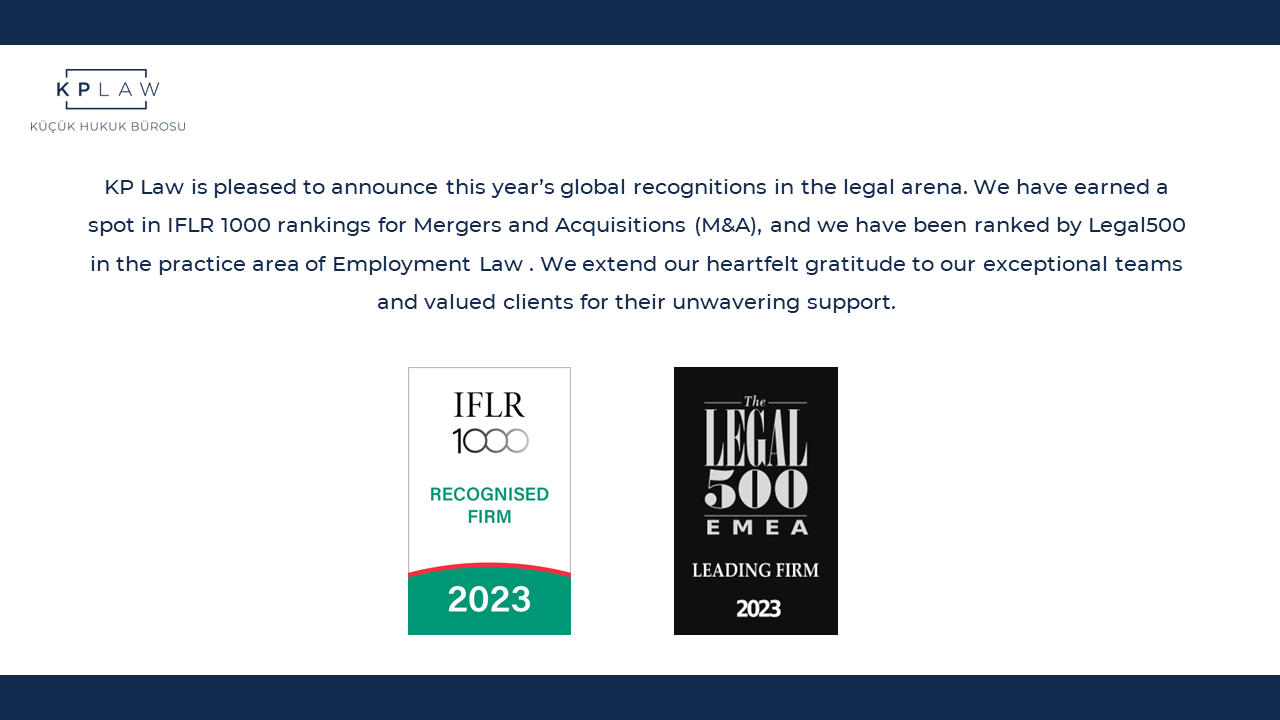News & Insights
Who Is The Owner Of The Works Created By The Employees?

Onur Küçük | MANAGING PARTNER
04.08.2023There are many different examples from many different sectors that come to mind when we think of job positions that require employees' creative power and ability to produce intellectual products. In order to survive in today's competitive markets, you need to stand out from the competition and have unique materials that will allow you to make a stronger impression on your target audience. For this reason, employers' need for creative employees with brilliant minds is ever-present, and the intellectual products created by these employees – such as graphic design, software, photography, copywriting, etc. - adds a striking value to the work carried out in this workplace. However, with the birth of an intellectual product, a number of questions that are important from a legal perspective may inevitably arise. As a matter of fact, when employees create intellectual products which can be defined as "works" according to the law, the issue of who obtains the related rights over this "work" is of critical importance. For this reason, it is useful to pay attention to who can use the intellectual rights on the works created by employees and how these rights can be used.
When An Intellectual Product Produced By An Employee Qualifies As A Work?
Pursuant to Article 1/B-a of Law No. 5846 on Intellectual and Artistic Works ("Law"), "work" is defined as all kinds of intellectual and artistic products that bear the characteristics of their author and are counted as scientific and literary, musical, fine arts or cinematographic works. In this respect, we can list the conditions for an intellectual product produced by employees to be considered as a work within the scope of FSEK as follows a) it must bear the characteristic of its owner b) it must have a material presence and c) it must be included in one of the limited types of works specified in the law. An intellectual product qualifies as a work only if it fulfills all these conditions at the same time. In this respect, if the intellectual product created by the employee is not only an idea, but also takes form and presence, reflects the creative mental effort of its owner and carries its originality, and is under one of the categories of "works of science and literature", "works of music", "works of fine art", "works of cinema" and additionally "works of art", now we can conclude that there is a "work" here. Among the conditions for being considered as a work, the most significant one is the condition of "bearing the characteristics of the owner". As a matter of fact, every difference in content and style is not capable of giving an intellectual product characteristic. A strong originality/authenticity/innovation is sought to be existing in the intellectual product. Characteristic determines the limit of protection under the FSEK. The higher the level of characteristic, the wider the scope of protection of the intellectual product. However, in a dispute brought before the court, whether the intellectual product meets the conditions of being a work or not is investigated and determined by the court ex officio.
With the creation of an intellectual work by the employee, the legal protection provided to the work under the FSEK starts automatically, without the need for any notification or registration. The owner of the work obtains the financial and moral rights on the work with the creation of the work, and in the event of an infringement of these rights, there are legal instruments available to protect the rights arising from the ownership of the work. The owner of the work may demand the prevention and elimination of the infringement through litigation, as well as material and moral compensation. For this reason, the issue of who owns the rights to the work produced by the employee is of great importance.
Before giving a clear answer to the question of who owns the rights to the work produced by the employees, it is necessary to have a look at the definition of " owner of the work" and what are the rights arising from the ownership of the work.
Pursuant to Article 8 of FSEK, the owner of a work is defined as "the person who created that work". In respect of works created by more than one person, if it is possible to divide the work into parts, each of these persons is deemed to be the owner of their part. If the work is an inseparable whole, the owner of the work is the union of those who created it. At this point, the work can only be created by natural persons. It is not possible for legal entities to create a work and therefore to be called as the owner of the work. As a matter of fact, since the owner of the work is the person who brings its special characteristics to the work by conveying the originality arising from his own spirit and ideas, it is not possible for legal entities to obtain the status of the owner.
The owner of the work has financial and moral rights over the work. Financial rights can be counted as the right of processing, reproduction, dissemination, representation, and communication to the public. Moral rights, on the other hand, are the right of public performance, the right to indicate the author's name, the right to prohibit modification of the work and the rights of the author against the owners and possessors. Moral rights are the rights granted to the owner directly related to his personality due to the connection between him and his work.
Although it is not possible for legal entities to be " owners of the work", they may, in exceptional cases, have financial rights over the work. However, legal entities cannot have moral rights.
Finally, when we come to the question of who owns the rights arising from the works created by the employee, who is a natural person, we need to check up on the provision of Article 18 of FSEK. Pursuant to Article 18/2 of FSEK;
"Unless it is otherwise understood from the special contract between them or from the nature of the work, the rights on the works created by officers, servants and employees in the course of their work shall be used by those who employ or appoint them. This rule shall also apply to the bodies of legal entities."
As seen in this provision, even though employees are referred to as " owners" in terms of the works created during the performance of their work, the "authorization to use" of the rights on the work legally belongs to the employers. Although the article contains the general expression "rights", it is controversial in the doctrine whether moral rights are also within this scope.
This is because moral rights are bonds that cannot be separated from the ownership of the work and that establish a personal relationship between the work and its creator. However, there are also doctrinal opinions arguing that moral rights may be exercised by employers or legal entities to the extent that they do not harm the personality of the owner of the work and to the extent required by the exercise of financial rights. On the other hand, in the decision of the 11th Civil Chamber of the Court of Cassation No. 2006/3490E., 2006/6930K., it is stated as follows.
"According to Article 18/2 of FSEK, although the plaintiff has the right to use financial rights, since he is not the owner of the work, he does not have the right to claim moral compensation in case of violation of the authorization to make the work accessible to the public.". In this decision, it is stated that even though the employee has the right to use the financial rights pursuant to Article 18/II of FSEK, it is emphasized that the moral rights belong to the employee who is the owner of the work. For this reason, we cannot say that there is a complete consensus on the subject in the doctrine.
Which Conditions Are Necessary For The Employer To Exercise His Rights Over The Work Produced By His Employees?
There are certain conditions for the employer to be authorized to use the financial rights on the work created by the employee. First, the work must be created by a public officer, servant or an employee. The concept of public officer is defined according to the Constitution and the Public Servants Law, while the concept of employee is defined according to the Labor Law legislation. It should be noted that the persons referred to in Article 18 of FSEK are employees who are dependent to the employer and in the event that there is no employment contract, it is accepted that Article 18/II of FSEK will not be applicable.
Another condition is that the employee must have created a work during the performance of the job. As a matter of fact, if the employee creates a work outside of working hours and not related to his work, the authorization to use the financial rights related to this work does not belong to the employer. This is because the authorization to use the financial rights regarding the work is given to the employer by law on the basis that public officers, servants or employees use the facilities of the employer while creating a work. In this respect, in the event that the employee creates a work with his own tools and equipment on his personal time, without the purpose of fulfilling any contractual obligation, it is not possible for the employer to have rights on this work.
Another condition is that it should not be otherwise understood from the contract, the law or the nature of the work. The parties may agree that the rights arising from the works created within the scope of the performance of the job shall belong to the employee. In this case, the employer shall have no rights over the work.
As a conclusion, Article 18 of the FSEK grants the employer the right to use the financial rights over the works produced by the employees within the scope of their job. However, there is no clear provision or consensus in the doctrine concerning whether it is possible for the employer to use the moral rights on the work. Employees who want to preserve their financial rights on the work they have created should protect them through special agreements to be concluded on this subject or with other articles to be included in their employment contract.
This article has been originally published on Harvard Business Review Türkiye on July 14, 2023. Please click here for the original article in Turkish

